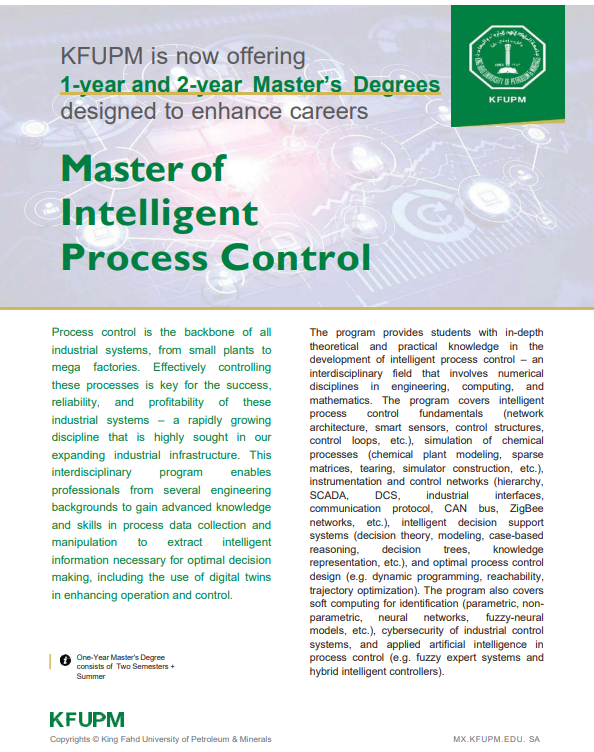Master of Intelligent Process Control
Program:
Master of Intelligent Process Control
Description:
Process control is the backbone of all industrial systems, from small plants to mega factories. Effectively controlling these processes is key for the success, reliability, and profitability of these industrial systems – a rapidly growing discipline that is highly sought in our expanding industrial infrastructure. This interdisciplinary program enables professionals from several engineering backgrounds to gain advanced knowledge and skills in process data collection and manipulation to extract intelligent information necessary for optimal decision making, including the use of digital twins in enhancing operation and control.
The program provides students with in-depth theoretical and practical knowledge in the development of intelligent process control – an interdisciplinary field that involves numerical disciplines in engineering, computing, and mathematics. The program covers intelligent process control fundamentals (network architecture, smart sensors, control structures, control loops, etc.), simulation of chemical processes (chemical plant modeling, sparse matrices, tearing, simulator construction, etc.), instrumentation and control networks (hierarchy, SCADA, DCS, industrial interfaces, communication protocol, CAN bus, ZigBee networks, etc.), intelligent decision support systems (decision theory, modeling, case-based reasoning, decision trees, knowledge representation, etc.), and optimal process control design (e.g. dynamic programming, reachability, trajectory optimization). The program also covers soft computing for identification (parametric, non-parametric, neural networks, fuzzy-neural models, etc.), cybersecurity of industrial control systems, and applied artificial intelligence in process control (e.g. fuzzy expert systems and hybrid intelligent controllers).
The Master program consists of 8 core courses from different disciplines that cover four domains: Modeling and simulation, control and intelligent instrumentation networks, advanced controller design techniques, Data analyses, AI/Machine learning in decision making. In addition, the student must finish a final project during the last two semesters. The final project will be completed under the program affiliated faculty supervision and will integrate the skills acquired from the core courses to work on intelligent process control related subjects.
Program Requirement:
- The applicant should have an accredited bachelor's degree or its equivalent degree in Mechanical Engineering, Electrical/Electronic Engineering, Control and Instrumentation System Engineering, Chemical Engineering, Petroleum Engineering, or discipline relevant to the program content.
- The applicant should demonstrate a prior background in a basic control theory like CISE 305 or EE 380 or ME 413 or CHE 401 or equivalent. Otherwise, he could be requested to take a related deficiency course.
Degree Plan:
Semester 1 (Fall)
- SCE 520: Introduction to Intelligent Process Control
- CHE 569: Simulation of Chemical Processes
Semester 2 (Spring)
- SCE 545: Instrumentation and Control Network
- ISE 528: Intelligent Decision Support Systems (IDSSs) for Process Control
Semester 3 (Fall)
- SCE 566: Optimal and Learning-based Process Control Design
- SCE 565: Soft Computing for Identification
- SCE 619: Project
Semester 4 (Spring)
- SCE 547: Cybersecurity of Industrial Control Systems
- SCE 567: Applied AI in Process Control
- SCE 619: Project
Duration: 2 Years
Delivery Mode: In-Person

